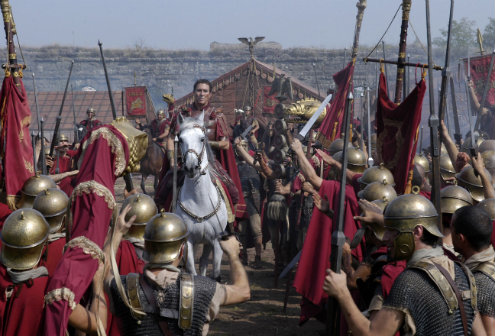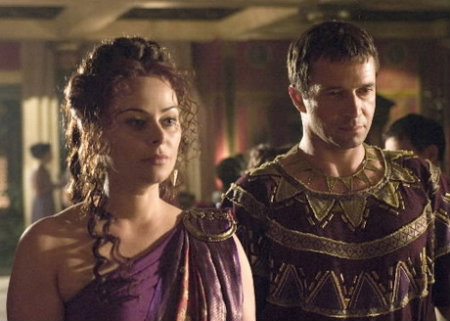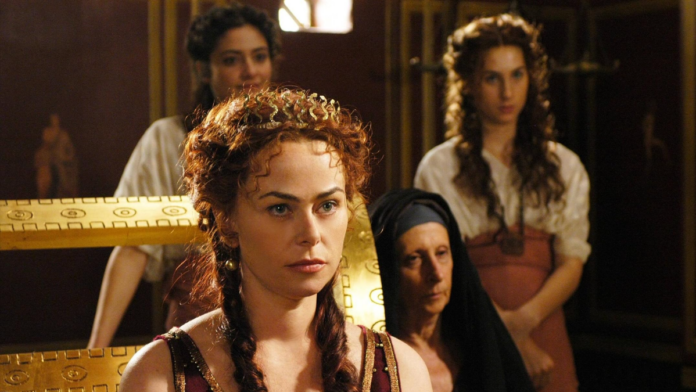Game of Thrones has emerged as a sensational hit for HBO, garnering a considerably broader audience than the typical epic fantasy series.
Undoubtedly, Game of Thrones stands out as an exceptional show, marked by intricate storylines, a multitude of complex characters, and a genuine respect for the intelligence of its viewers.
However, when we examine its external elements—the grandeur of its narrative, the sword-and-sandals action sequences, the presence of morally ambiguous characters engaged in political intrigues—we find that these aspects are not entirely novel for HBO.
Just a few years earlier, the series Rome encompassed these very elements. Yet, despite being a modest success, Rome did not achieve the same level of viewership as Game of Thrones.
This leads us to the question: What sets Game of Thrones apart, and what distinguishes the era in which it was broadcast?
Rome can be considered almost like a precursor to Game of Thrones. Similar to GOT, Rome operates with exceptionally high stakes, where the fate of the world hinges on every decision made by its characters.
Personal character journeys play out on a grand scale, with sons rebelling against fathers and brothers pitted against brothers, all striving to reshape the world order.
Brutus’ assassination of Caesar, for example, is a blend of the personal and political, much like the conflict between Antony and Octavian in Season 2.
You might want to read: Women in the Box: Rachel Green, Monica Geller, and Phoebe Buffay, Friends.
Octavian’s motivation to defeat Antony is driven by both his ambition for imperial dominance and his long-standing childhood resentment of his stepfather.
In a similar vein, the conflict between Stannis and Renly is driven by a combination of factors: Stannis’ unwavering commitment to the laws of succession and Renly’s determination to thwart his older brother’s ambitions.
Similarly, Daenerys only emerges as a formidable player when she manages to break free from her brother’s abusive influence.
The worlds portrayed in these series are simultaneously familiar and exotic. Rome is firmly rooted in historical reality, while “Westeros” draws inspiration from medieval Europe.
Both realms possess an otherworldly quality yet remain oddly recognizable: while their settings may be distant from our own, both worlds are inhabited by distinctly human characters.
Even the characters themselves are archetypes that reappear in both series. Atia serves as a precursor to Cersei, an ambitious and entitled noblewoman grappling with the constraints imposed by her gender.
Cicero, a skilled politician and manipulator, foreshadows characters like Littlefinger and Varys. Octavia and Sansa both undergo a process of learning to navigate the treacherous political landscape as their trust in those around them wanes.
None of the prospective rulers in either Rome or King’s Landing can be considered ideal choices, yet they all emerge as intricate, fully fleshed-out individuals.
So, why did “Game of Thrones” become the bigger hit? What makes the inhabitants of Westeros vastly more captivating than the Jullii and Junii? The answer may be found in the show’s inherent unpredictability.

Unpredictability is inherently woven into the very essence of Game of Thrones in a manner that doesn’t apply to Rome. Much like the books from which it draws inspiration, GOT heavily relies on defying the audience’s expectations.
Ned Stark initially serves as the audience’s conduit into this world, a fundamentally virtuous man grappling with the unfamiliar realm of courtly intrigue. In another show, he would likely remain the central character throughout the series, and we would navigate the world primarily through his perspective.
In Rome, he would fulfil a similar role to that of Lucius Vorenus and Titus Pullo – a perpetual outsider akin to both them and the audience itself.
However, in Game of Thrones, this is far from the truth—Ned Stark meets his demise in the ninth episode of the first season, a moment that defies all the expectations the audience had for the show.
His death upends the narrative and leaves us in the same disoriented state as his children—adrift in the complex universe of the show without their father’s guidance.
When a young king can order Ned’s execution against the counsel of his advisors and his own mother, it suddenly becomes evident that anything is possible in the world of Westeros.
The unpredictability of the plot creates vast opportunities for character development. How the characters respond to unimaginable events becomes central to the show’s narrative.
For instance, Jaime Lannister’s arrogance and cruelty dissipate the moment he becomes a victim of cruelty himself.
His agony following his maiming instantly transforms him into a more intricate and sympathetic character compared to the man who callously pushed a child out of a window with a casual remark.
The feeling that anything is possible pervades every episode of “Game of Thrones,” leaving the audience in a state of constant anticipation. At any given moment, the unexpected can occur, and in the aftermath, any character can unveil their true nature.
The series is a perpetual and relentless source of surprises, captivating a diverse audience, including those who have already read the show’s source material.
In the world of Westeros, as described by Littlefinger, it’s a realm of chaos, a ladder that individuals must either ascend or descend from.
In contrast, Rome was a considerably more straightforward show, both in its inherent nature and intended design. Naturally, Rome is rooted in historical events, while Game of Thrones is not.
The audience goes into Rome with the foreknowledge that Brutus and Cassius will assassinate Caesar and that Antony and Cleopatra will ultimately meet their tragic fate.
This inherent predictability within Rome hinders it from creating the same feeling of subversion found in Game of Thrones. However, it’s essential to note that Rome wasn’t crafted with the intent of evoking the same sense of chaos.
The characters’ motivations in Rome are notably more straightforward and consistent. Even unexpected twists, such as the adult Augustus’ thirst for power, are subtly hinted at and foreshadowed, as seen in Octavian’s sense of entitlement.
Although Rome is a well-executed series, it lacks the sense of intrigue and exhilaration that Game of Thrones possesses.
The element of not knowing what will transpire in the next moment, let alone in the next season, is a significant aspect of the appeal and ongoing success of Game of Thrones.
The chaotic essence of “Game of Thrones” thrives in an era characterized by anti-hero dramas and mega-cast productions.
The established audience affinity for characters like Tony Soprano, Don Draper, and Walter White prepared viewers to empathize with the likes of the Lannisters, Targaryens, and Greyjoys.

Furthermore, shows boasting extensive ensembles, such as “Lost” and “Heroes,” set the stage for the multitude of characters in the world of Westeros.
The unpredictability of Thrones resides at the crossroads of the anti-hero phenomenon and the prevalence of large ensemble casts. In Thrones, a villain can swiftly transform into a hero, and a hero can just as swiftly meet their permanent end.
A character with minor significance in one episode might take centre stage in the next. The show’s triumph lies in the fact that its suspense found an audience that was primed and eager to embrace it.
In contrast, Rome is a well-crafted series but remains a relic of an earlier era in television drama, even now, only a few years after its conclusion.



I love how Game of Thrones thrives where Rome failed. The characters are so well written and the plot is always moving forward.